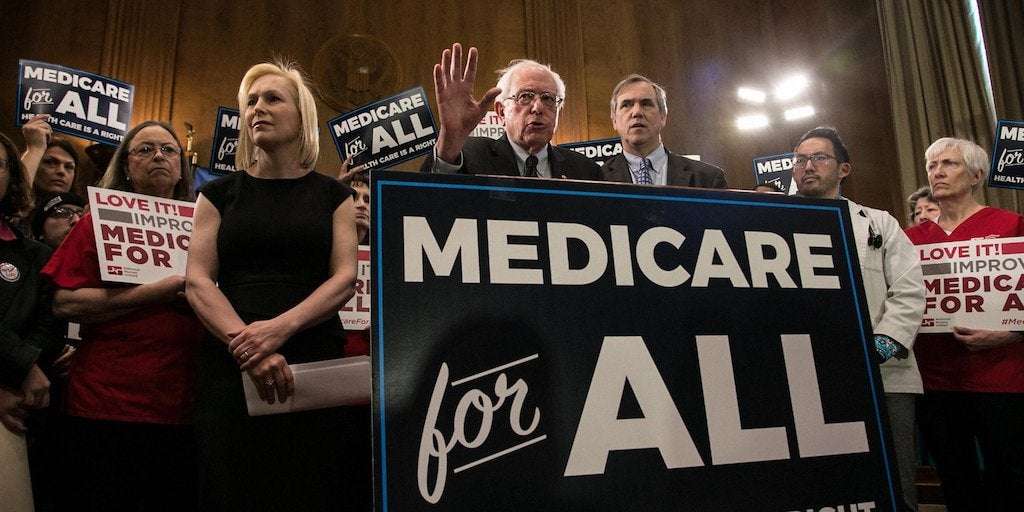Photo by The Asahi Shimbun via Getty Images
Twenty of the nation's leading economists argued in favor of Medicare for All in an open letter that Business Insider first published on Tuesday.
They argue that existing research suggests there would be massive savings and it would reduce waste in healthcare.
"There's been too much loose talk that Medicare for All is unaffordable. What's really unaffordable is the current system," signatory Gerald Friedman said in an interview.
Visit Business Insider's homepage for more stories.
Twenty of the nation's leading economists argued in support of Medicare for All in an open letter first published by Business Insider on Tuesday.
"We believe the available research supports the conclusion that a program of Medicare for All (M4A) could be considerably less expensive than the current system, reducing waste and profiteering inherent in the current system, and could be financed in a way to ensure significant financial savings for the vast majority of American households," the economists wrote in the open letter.
"Most important, Medicare for All will reduce morbidity and save tens of thousands of lives each year," the group of economists said.
The letter was provided by Business for Medicare for All, an advocacy group pressing for universal healthcare in the US.
The economists aren't coming out in favor of a specific candidate, though some have individually consulted with Democratic presidential campaigns (at least one has endorsed Sen. Bernie Sanders).
Instead, they're making the case that a government-run health insurance system would slash wasteful spending and generate massive savings for most Americans.
Dr. Gerald Friedman, a professor at the University of Massachussetts Amherst, told Business Insider that the best argument for a universal healthcare system is its potential ability to rein in the skyrocketing costs of healthcare.
"There's been too much loose talk that Medicare for All is unaffordable," Friedman said. "What's really unaffordable is the current system. We spend about twice the average for affluent countries in the OECD on healthcare," referring to the Organization of Economic Cooperation and Development.
Friedman also noted that increased spending often leads to worse health outcomes compared to other developed nations.
Among the letter's signatories are prominent progressive economists like former Labor secretary Robert Reich; Jeffrey Sachs, a leading expert on poverty; Gabriel Zucman and Emmanuel Saez, two professors at the University of California, Berkeley, who laid out plans for a wealth tax; and Darrick Hamilton, a professor of economics at the Ohio State University and a pioneer in economic inequality research.
Medicare for All is the signature plan of Sen. Bernie Sanders, the remaining progressive candidate in the Democratic primary. It would set up a new government health insurance system that provides comprehensive benefits to Americans and toss out deductibles, co-pays, and out-of-pocket spending. Private insurance would be eliminated as well.
Estimates for a system that ensures benefits on the scale Sanders is seeking is upwards of $30 trillion over 10 years. A recent study from the Economic Policy Institute, a left-leaning organization, suggested it could increase the wages of workers and boost the development of small businesses.
The proposal turned into an ideological faultline in the primary, dividing moderates like former Vice President Joe Biden who sought incremental measures to expand coverage and progressives such as Sanders calling to replace the existing system with something entirely new.
In addition to Sanders, Sen. Elizabeth Warren also rolled out a plan to achieve universal healthcare within four years before dropping out of the race.
Skeptics of Medicare for All argue it's a progressive pipe dream that won't be achieved anytime soon. They note it'd be an enormous lift politically even among Democrats, most of whom don't support the idea, The New York Times reported.
An ongoing poll from the Kaiser Family Foundation found that while a slim majority of the public supports Medicare for All, backing flips when respondents learn they could lose their private health insurance or pay more in taxes.
The economists in the letter, though, say that "shifting the burden" onto taxation of wealthier households would "magnify savings."
"A system that cuts costs and shifts financing to income and wealth taxes will dramatically lower this burden, producing significant savings for workers and businesses," they write.

yesno242 on March 10th, 2020 at 21:14 UTC »
Which is literally why there is a multi billion $ disinformation crusade against it
theoretical-zero on March 10th, 2020 at 21:12 UTC »
Assuming I faced a 4% tax hike, it would save me about $5,000 per year.
remote_production on March 10th, 2020 at 20:37 UTC »
Is it good for existing American Corporations?
No, well wishful thinking then huh